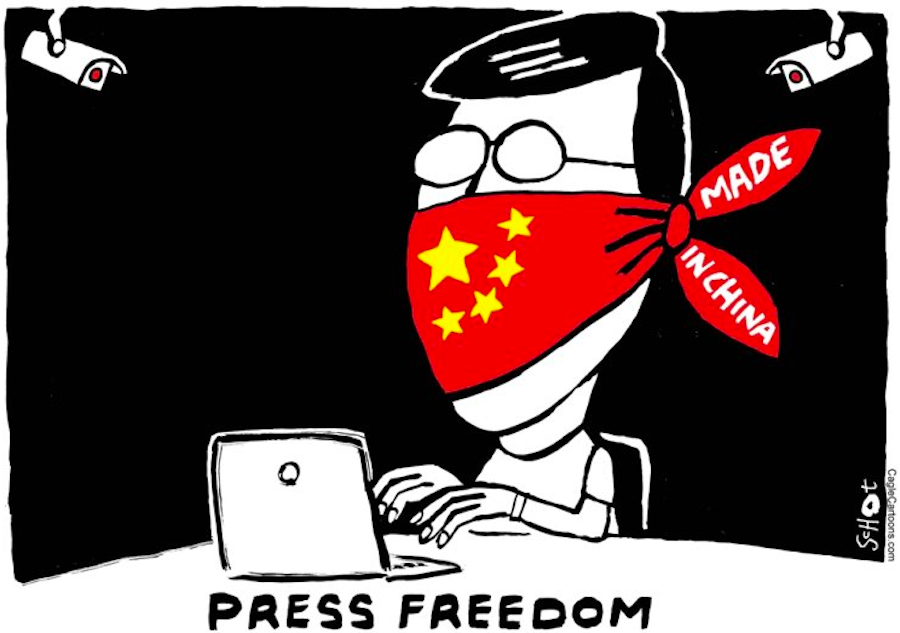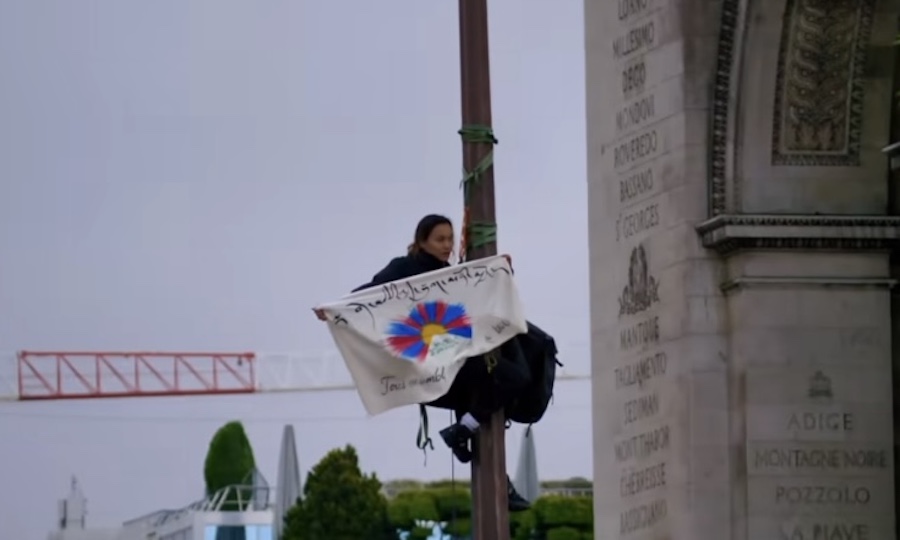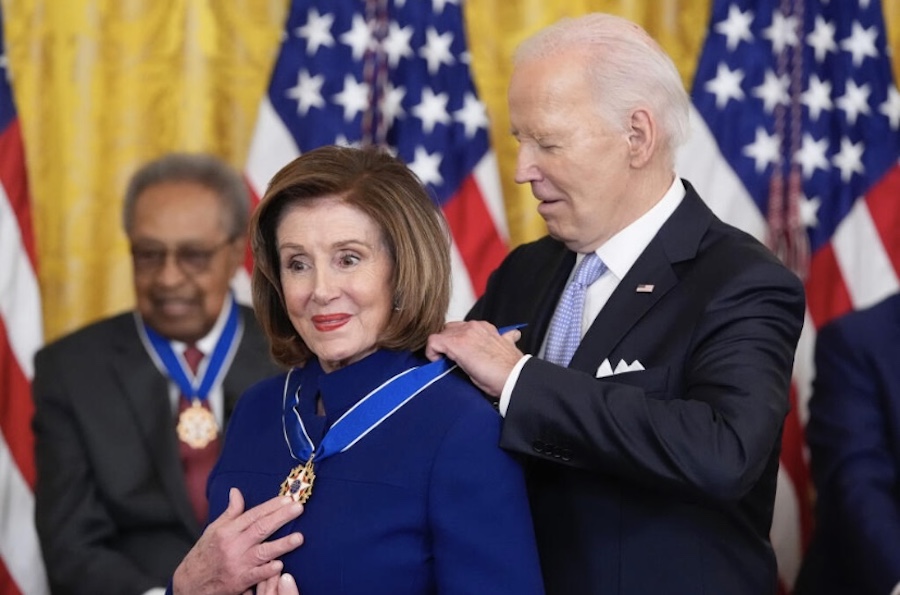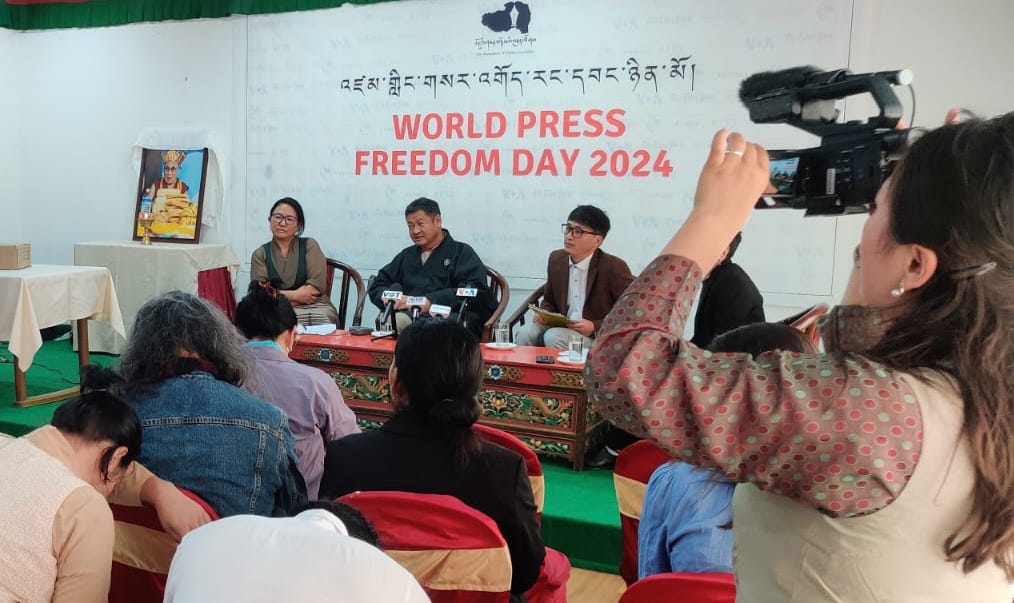by Chi-hui Yang
 This month Cinema Asian America features the video-on-demand premiere of Tenzing Sonam and Ritu Sarin’s groundbreaking Tibetan film “Dreaming Lhasa“. Set in the Tibetan exile community in Dharamsala, India, the film tells the story of Karma, a Tibetan filmmaker from New York, who goes to the Dalai Lama’s exile headquarters in northern India, to make a documentary about former political prisoners who have escaped from Tibet. As she finds herself unwittingly falling for one of her subjects, she is sucked into the passion of his quest, which becomes a journey into Tibet’s fractured past and a voyage of self-discovery.
This month Cinema Asian America features the video-on-demand premiere of Tenzing Sonam and Ritu Sarin’s groundbreaking Tibetan film “Dreaming Lhasa“. Set in the Tibetan exile community in Dharamsala, India, the film tells the story of Karma, a Tibetan filmmaker from New York, who goes to the Dalai Lama’s exile headquarters in northern India, to make a documentary about former political prisoners who have escaped from Tibet. As she finds herself unwittingly falling for one of her subjects, she is sucked into the passion of his quest, which becomes a journey into Tibet’s fractured past and a voyage of self-discovery.
As a team, you have made several landmark documentaries about Tibet, including1998’s “The Shadow Circus: The CIA in Tibet” and the recent “The Sun Behind the Clouds: Tibet’s Struggle for Freedom.” Why is it important for you to make films about Tibet and Tibetans?
TS: I was born in India to Tibetan refugee parents and grew up there as part of the exile Tibetan community. Our entire raison d’etre for being in exile was to contribute to the struggle for Tibet’s freedom, so all my life, this has been an overriding concern. In this regard, there is very little separation between my work and my life.
RS: When we first started making films together, there were no Tibetan filmmakers. Films about Tibet were made by non-Tibetans, and although many were well-made and extremely useful in spreading the message about the situation in Tibet, it seemed to us that they always had the perspective of an outsider. I became very involved with the Tibetan community along with Tenzing (we are married and have two children together) and we felt it was really important for Tibetans to make their own films, to tell their own stories, and this is one reason why we focused so much on Tibetan subjects.
(Watch “Dreaming Lhasa” on XFINITY On Demand)
“Dreaming Lhasa” is your first fiction film; what drew you to make a narrative film after so many years of creating documentaries? What is the difference for you, and is there a creative friction between the two which is useful?
 RS: Although we started our filmmaking careers making documentaries, we were both huge film buffs. During our student years in the Bay Area, we spent most of our free time in the various repertory theatres there, watching countless movies. So, in a weird way, although we were documentary filmmakers, our cinematic influences were all feature filmmakers. We always nurtured this ambition to make a feature film ourselves and that opportunity came with Dreaming Lhasa.
RS: Although we started our filmmaking careers making documentaries, we were both huge film buffs. During our student years in the Bay Area, we spent most of our free time in the various repertory theatres there, watching countless movies. So, in a weird way, although we were documentary filmmakers, our cinematic influences were all feature filmmakers. We always nurtured this ambition to make a feature film ourselves and that opportunity came with Dreaming Lhasa.
TS: I think most documentary filmmakers who venture into fiction tend to stay somewhat close to their documentary roots. Dreaming Lhasa, too, has many documentary aspects to it, so in that sense, the fact that we had years of experience in that field helped us meet the challenge of turning to fiction. Also, I think we really enjoyed the creative freedoms that working in fiction opened up for us and perhaps, were a little hesitant to take full advantage of that. The biggest challenge we faced was to work with actors, especially since, in our case, they were pretty much all non-professionals. The other challenge was to render the Tibetan language so that it sounded natural and colloquial. Written Tibetan is very different from spoken Tibetan and because we have no tradition of naturalistic acting, the actors can often sound stilted as if they were reading text.
Both of you have lived diasporic lives; you were both born in India and have lived in many places, including the Bay Area and the UK. Likewise, Dreaming Lhasa’s main character, Karma is a Tibetan woman living in New York, and also is a documentary filmmaker. Was it important for you to create a more personal film in this way?
TS: Absolutely. The character of Karma was very much modeled after our own experiences as nomadic and rootless people. There are many aspects of myself in her character. The questions of cultural identity, assimilation, political responsibility…these are all challenges that we are constantly confronted with as exiles. It was very important to reflect this in the film.
RS: Tenzing wrote the script after we moved back to Dharamsala, India, after having lived in various places outside India for nearly 20 years. We partly decided to make the move back to Dharamsala so that we could reconnect with the exile Tibetan community, and made the writing of the script more feasible.
Your most recent documentary, “The Sun Behind the Clouds: Tibet’s Struggle for Freedom” created quite a controversy when it was released and drew the attention and quite public criticism of the Chinese government. What has been the impact of this for you as filmmakers?
RS: Yes, at the Palm Springs International Film Festival, Chinese officials put pressure on the director, asking him to remove our film from the schedule because it was anti-Chinese. When the director refused, two Chinese films were pulled out of the festival. On the one hand, the publicity generated by this controversy certainly helped to put the spotlight on our film. However, we believe that the Chinese government’s heavy-handed tactics sent a strong message to film festivals everywhere: If you show films that we consider detrimental to our national image, we will stop you from having access to Chinese films. This is an insidious threat for it forces festival programmers to exert some kind of self-censorship. There are so many great Chinese films coming out of China; how many programmers would risk not being allowed to show them in favor of taking a stand on a Tibetan film? We know for a fact that festival directors have been asked to sign letters stating that they would not show certain films in return for being allowed to screen Chinese films. So, it really made us conscious of how the space for films such as ours is diminishing, and how important it is to fight to keep film festivals and other art spaces independent from political pressure.
What are you working on now?
TS: We are working on our first non-Tibetan film in many years! It’s a documentary film called, “When Hari Got Married”. It’s about Hari, a 30-year-old taxi driver in Dharamsala as he prepares for his arranged marriage to a girl he has never met, but with whom he has nevertheless fallen in love on the mobile phone. Outspoken, opinionated and funny, Hari expounds on love, caste, the state of India and his own upcoming marriage, as frantic preparations are afoot to make sure that the wedding goes off without a hitch. How will Hari react to finally meeting his telephone love in the flesh? What does the future hold for him and his young bride in a rapidly changing world? The film will take an intimate and humorous look at the changes that are taking place in rural India, as modernity and globalization meet age-old traditions and customs.
For more information on Tenzing and Ritu’s films, visit: www.whitecranefilms.com









